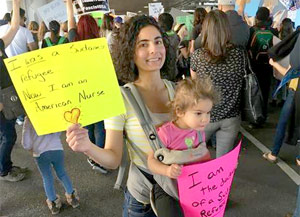Blog
Why America’s Nurses Oppose the Muslim Ban
 National Nurses United joins with humanitarian and civil rights and civil liberties groups in opposing the executive order to ban refugees, especially Muslim refugees, from entering the U.S.
National Nurses United joins with humanitarian and civil rights and civil liberties groups in opposing the executive order to ban refugees, especially Muslim refugees, from entering the U.S.
What the Ban Does
The ban bars all refugees for at least four months — and indefinitely lon-ger for refugees from war torn Syria. It bars for three months all entrants, some 218 million people, from seven predominantly Muslim nations — Syria, Iran, Iraq, Libya, Somalia, Sudan, Syria, and Yemen, and directs the Department of Homeland Security to conduct a review, which could add other countries to the ban. Long-term U.S. residents, including medical professionals, have also been blocked by the ban.
Why is this Called a Muslim Ban?
President Trump directs DHS to prioritize asylum for Christians and other non-Muslim minorities, claiming Christians have been treated unfairly by U.S. refugee policy. However, since 2001, the United States has accepted nearly 400,000 Christian refugees and 279,000 Muslim refugees. Most victims of extremist violence in the Middle East are Muslim.
Why NNU Opposes the Ban
- Nurses are advocates for relief of human suffering. The civilian death toll from the brutal civil war in Syria alone is now believed to be nearly 500,000, many of them children. Slamming the door on refugees is antithetical to the mission of nursing.
- No one from any of the seven nations cited by the ban have committed any attacks in the U.S., nearly all were committed by native-born Americans. In announcing the executive order, President Trump cited the attacks of September 11, 2001 and San Bernardino. Yet none of those attackers were from any of the seven countries listed.
- There is no evidence that the ban will make the U.S. safer. Republican Senators John McCain and Lindsey Graham, among many others, have warned it will only put more Americans at risk by fueling a narrative of a U.S. war against Islam. ISIS is already using the ban as a recruiting tool.
- The United States is a nation of immigrants. Yet there is a troubled history of rejecting refugees and immigrants, including the racially motivated Chinese Exclusion Act, and the rejection of Jewish refugees fleeing Nazism in World War II. Since then, the U.S. has welcomed many refugees fleeing authoritarian regimes, we should not be slamming the door today on people and families in crisis.
What You Can Do
Urge your Senator and Congress member to oppose and work to revoke the ban www.nationalnursesunited.org/elected-officials
Join NNU at rallies across the country in support of refugees and their families. #NoBanNoWall